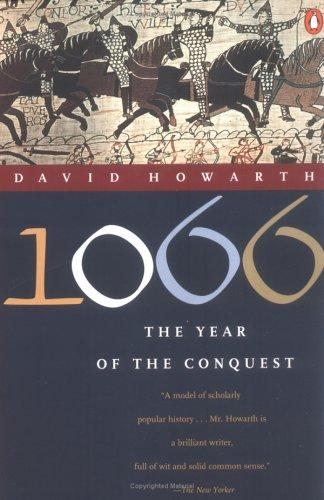1066 The Year of the Conquest
4 stars
Excellent overview of the subject. A highly readable, down to earth, unpretentious prose style. It avoids the trend in a lot of popular history writing of gradiose puffery of the topic (10 page forewords, hysterical framing, etc). I read it in about four sittings. Available from your shadow library of choice.
It covers the whole year of 1066 and starts from the perspective of the peasantry, describing key social institutions such as the villlage, the thanes, the forums for dispute resolution called 'hundreds' and so on. I didn't know that English monarchs were elected by a sort of proto-parliament, and that heredity was a secondary factor in determing kingship.
It illustrates the key figures involved. You get a keen sense of their psychological states and the political hands they were dealt: Edward the Confessor's frustration with his duties and never feeling truly at home with his own people, in part …
Excellent overview of the subject. A highly readable, down to earth, unpretentious prose style. It avoids the trend in a lot of popular history writing of gradiose puffery of the topic (10 page forewords, hysterical framing, etc). I read it in about four sittings. Available from your shadow library of choice.
It covers the whole year of 1066 and starts from the perspective of the peasantry, describing key social institutions such as the villlage, the thanes, the forums for dispute resolution called 'hundreds' and so on. I didn't know that English monarchs were elected by a sort of proto-parliament, and that heredity was a secondary factor in determing kingship.
It illustrates the key figures involved. You get a keen sense of their psychological states and the political hands they were dealt: Edward the Confessor's frustration with his duties and never feeling truly at home with his own people, in part due to his sanctimonious faith; Harald Hardrada's Klingonlike thirst for violent skirmish and conquest (a shameless war tourist whose lifestyle could quite accurately be described as jihadist); William's blind self-confidence and almost lunatic trust in fate, regardless of how stacked against him the odds were of his campaign succeeding.
One of the key takeaways about the conquest itself: the unwitting use of psychological warfare (against the English monarch Harold) thanks to the indirect involvement of the Catholic church, and how effective it was in sowing FUD.
The sections on how ill-equipped the Normans were for seafaring were also fascinating. Indeed in the 11th century boats were about getting armies from one landmass to another and nothing else; the concept of a fighting maratime force such as a navy really wasn't a thing.

